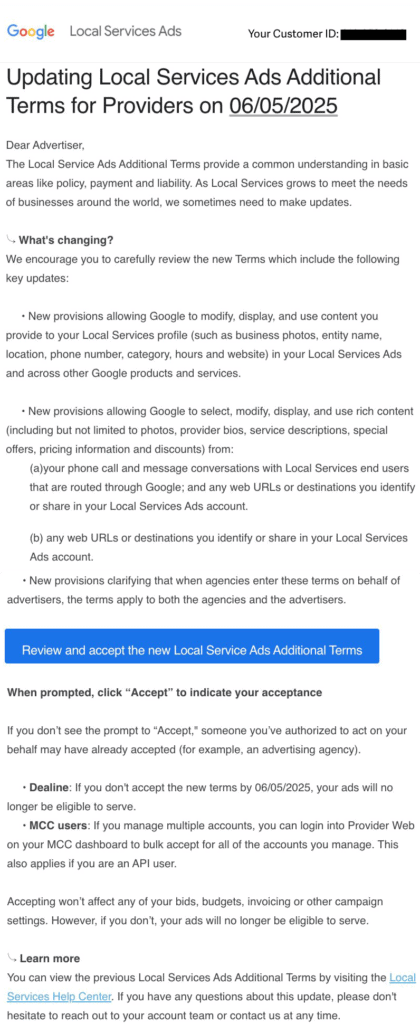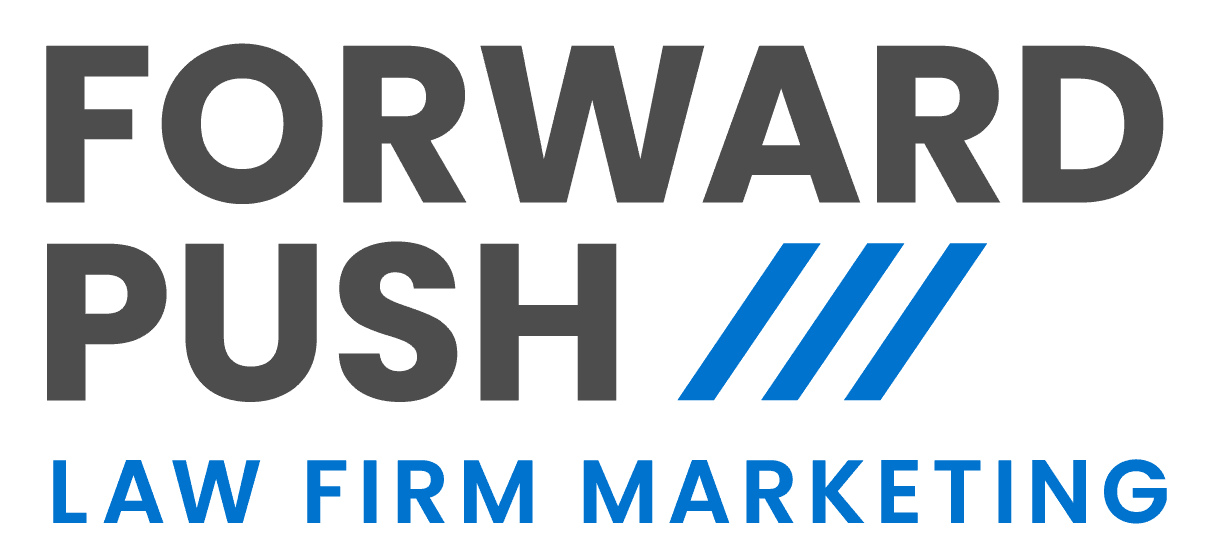By Marc Apple ● ● 5 min read

Table of Contents
TL:DR Google now claims ownership of all data generated through Local Services Ads—including your law firm’s call recordings and intake messages—and may use it to build new products.
No time to read? Listen to a conversation about this blog post instead.
If you’re a solo attorney or partner at a small law firm investing in Google Local Services Ads (LSAs), there’s a critical change you need to know about. As of April 2025, Google has updated its LSA policies to assert ownership over call recordings and intake data generated through the platform.
Advertisers are required to accept these new terms by June 5, 2025; failure to do so will result in their ads becoming ineligible to serve.
This shift is subtle but significant—and it could have major implications for how your firm manages client intake, data privacy, and marketing performance.

Advertisers are required to accept these new terms by June 5, 2025; failure to do so will result in their ads becoming ineligible to serve
What Changed
Google has modified its LSA terms to state that it “owns all data derived from or associated with the use of Local Services Ads.” This includes the recorded calls your firm receives through LSAs, even when those conversations involve prospective clients disclosing sensitive information.
In addition, Google reserves the right to analyze call recordings and text messages using artificial intelligence. This means data points such as service needs, urgency, pricing, and even legal issue types could be extracted and interpreted algorithmically.
Perhaps more concerning, the updated terms also allow advertising agencies to accept these conditions on behalf of law firms. This means your firm might already be opted in—without you reviewing the implications firsthand.
Importantly, the new terms also introduce language that may give Google broad rights to develop new products or services from the data it collects through LSAs. That includes data from call recordings, messages, and lead interactions—even if the lead doesn’t convert into a paying client.
Additionally, advertisers who accept the new terms must agree not to use the data for any purpose other than lead follow-up, creating a significant imbalance in control and utility.
In effect, Google is positioning itself as the data owner, processor, and analyst—not just the platform host.
Here’s what the letter that was sent to advertisers looks like:


That lack of transparency is concerning—especially when you’re paying to generate the leads in the first place
Why It Matters to Law Firms
For law firms, this isn’t just a technicality. It’s a matter of ethics, compliance, and client trust.
- Client Confidentiality at Risk
Legal intake conversations often involve personal and potentially privileged information. With Google asserting ownership over these recordings—and using AI to analyze them—it raises serious questions about how that data could be used, stored, or even shared. - Loss of Marketing Insights
Many firms rely on LSA call recordings to audit lead quality, train staff, and refine intake processes. If access to these recordings becomes restricted or repurposed by Google, your ability to optimize campaigns could be compromised. - Reduced Transparency
Google has not clearly stated how it will use or share this data. That lack of transparency is concerning—especially when you’re paying to generate the leads in the first place. - Risk of Ethical Conflict
Attorneys are bound by rules of professional conduct and client confidentiality. Google’s data usage practices may not align with your jurisdiction’s ethical standards, and that could open your firm to unintended consequences. - Restrictions on Your Own Data Usage
While Google retains expansive rights over your call and message data, the terms limit how you, the advertiser, can use that same data. Firms are prohibited from using it for anything beyond following up with a lead. This one-sided arrangement places firms at a strategic disadvantage.

This change doesn’t mean you should abandon LSAs
What You Can Do About It
This change doesn’t mean you should abandon LSAs. They remain one of the most effective tools for driving new client calls. But it does mean you need to protect your firm and your clients by taking control of your intake data.
At Forward Push, we help law firms set up independent call tracking systems that capture recordings outside of Google’s ecosystem. This ensures you retain ownership and access, even if Google decides to limit visibility into LSA-generated leads.
We also provide LSA management tailored for law firms, so you’re not just running ads—you’re running a compliant, strategic intake funnel that puts your firm in control.
A Wake-Up Call for Data Stewardship
Google’s move is part of a broader trend toward platform consolidation of data. For attorneys, the lesson is clear: you can no longer afford to outsource all control of your client intake pipeline.
As privacy expectations grow and legal marketing becomes more competitive, law firms must treat intake data with the same care as case files.

Law firms must treat intake data with the same care as case files
Worried You’re Losing Control of Your Client Intake Data?
If your firm is relying on Google LSAs and you’re unsure what’s happening with your call recordings, message data, or intake process—let’s fix that. My team and I will personally review your marketing strategy, show you where data control is slipping away, and map out how we can protect your firm while growing your lead flow. Click to schedule your free Law Firm Lead Flow Acceleration Session now.
FAQs About New LSA Rule
What is the new LSA data policy change?
Google now claims ownership of all data generated through Local Services Ads, including call recordings and client intake information.
Does this affect attorney-client privilege?
It may not breach privilege directly, but it raises serious questions about how sensitive information is handled and who has access to it.
Can I still access my LSA call recordings?
Yes, for now. But the long-term direction suggests Google could restrict or alter access. It’s best to have an independent system in place.
What can I do to protect my firm’s data?
Use third-party call tracking tools that archive recordings independently from Google. Also, ensure your intake system is documented and secure.
Should I stop using LSAs?
Not necessarily. LSAs still deliver strong results, but they need to be managed more carefully in light of Google’s data ownership stance.
How can Forward Push Law Firm Marketing help?
We offer LSA campaign management and compliant call tracking solutions that ensure your data remains yours.
Is this a legal compliance issue?
Potentially. Law firms should consult with compliance advisors to evaluate how Google’s policy aligns with state bar and privacy regulations.
Can my agency accept these terms for me?
Yes. Agencies managing your LSA account can accept the terms on your behalf, which is why it’s crucial to verify whether your firm has already opted in—intentionally or not.
Am I restricted in how I use LSA lead data?
Yes. Google’s updated terms limit your use of the data to lead follow-up only, even though Google retains broader rights. This may impact your ability to learn from or repurpose intake conversations.




